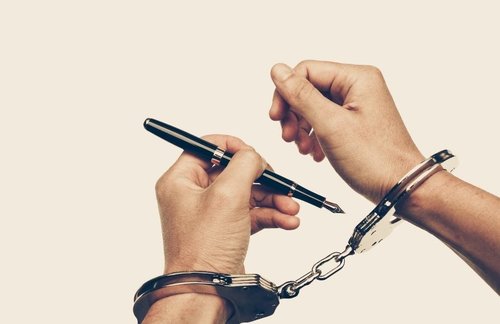When it comes to violations against female journalists globally, analysts show one country accounts for around one-fifth of all cases: Turkey.
The country “ranks number one worldwide for violence against women and nonbinary journalists,” said Kiran Nazish, founding director of the nonprofit organization Coalition For Women In Journalism, or CFWIJ.
Her organization found that cases documented in Turkey made up more than 20% of the 277 global violations from Jan. 1 to July 31, 2023.
“The whole ecosystem in Turkey under Erdogan has been very, very hard on anyone who asks questions or has a voice,” said Nazish, referring to President Recep Tayyip Erdogan.
In May, Erdogan was re-elected for a third term. Media watchdogs have documented a steady decline in press freedoms under his leadership so far.
The World Press Freedom Index ranks Turkey 165 out of 180 countries, with 1 being the best media environment.
In a country where the government controls more than 90% of the media, independent news organizations are heavily monitored and often face censorship and legal harassment, according to the CFWIJ.
But outlets that cover Kurdish and women’s issues are especially under threat, said Nazish.
“We have data over the last four years in Turkey, and at any given time, you would always see, and we’ve always observed, that from 60 to 80% of women journalists who get targeted are Kurdish. They’re always in the majority,” Nazish told VOA.
Most are accused of being members of a terrorist organization, a reference to the outlawed Kurdistan Workers’ Party, or PKK.
Turkish forces for years have been engaged in a deadly conflict with the PKK, which wants control of predominantly Kurdish areas in Iran, Iraq, Syria and Turkey. The PKK is designated a terrorist organization by Turkey, the United States and the European Union.
Gurkan Ozturan, who coordinates the Media Freedom Rapid Response at the European Centre for Press and Media Freedom, or ECPMF, said he also has seen Kurdish journalists disproportionately targeted.
Even though “they represent a much smaller portion of the overall media landscape,” Ozturan said, they make up the majority of journalists imprisoned.
The Turkish Embassy in Washington did not return VOA’s emailed request for comment.
When asked previously about jailed journalists, the justice ministry said via email that the courts’ independence is guaranteed under Turkey’s constitution and that it works within its “scope and jurisdiction.”
Of the 40 journalists in custody for their work in late 2022, 25 were Kurdish or worked for Kurdish media, according to the New York-based Committee to Protect Journalists.
Many of those were detained in June 2022 during a police raid on the southeastern city of Diyarbakir.
Among them: Safiye Alagas, managing editor of JIN News, an all-women news agency located in the southeast, predominantly Kurdish region of Turkey.
In written responses provided to VOA by CFWIJ, Alagas said she has been regularly harassed while on assignment.
Police prevented her from filming mothers on a hunger strike. Alagas said that she and her team were “subjected to numerous judicial and police harassments” as well as harassment on social media for covering stories about women who were raped by police officers, guards and a soldier.
Alagas said that reporting on injustices by the Turkish government against Kurds “can be very risky.” But she feels an obligation to continue.
“As a female journalist, I feel it is necessary to speak up for women and issues they face. … If those in power and authorities feel uncomfortable with me in a certain place, then I must be on the right path,” said Alagas. “I did not become a journalist to serve them. I chose this profession to give a voice to those who experience injustice, particularly women.”
Alagas, 33, began working as a journalist when she was 18. From a young age, she felt drawn toward the profession.
When she was 3 years old, the village where she lived was bombed and residents were forcibly evacuated and relocated to big cities where, she said, they “were excluded and lived in poverty.”
The early experiences were formative. “I felt like I had a responsibility to use my voice to make a difference,” she said.
After her arrest in June, Alagas was charged with “being a member of a terrorist organization.” If convicted, she could face up to 15 years in prison. Her next hearing is scheduled for November.
Ozturan of the ECPMF said charges of terrorist affiliation are common for Kurdish journalists. “[Terrorism] is one of the most liberally used terms when it comes to suppressing the opposition and independent voices,” Ozturan told VOA.
More recently other groups, including anyone who identify as LGBTQ, have been called terrorists by government-run media organizations, said Ozturan, who calls the claims baseless.
The targeting of Kurdish journalists is part of a more widespread campaign of censorship in the country, Ozturan said. “Starting from the beginning of the year, we have seen an upsurge in the number of access-blocking orders issued, targeting the news agencies.”
In the first week of June alone, 307 articles were blocked, a marked increase over the 67 recorded during the same period last year, according to the European Centre for Press and Media Freedom.
Ozturan said news agencies are often threatened with court cases and heavy fines if they don’t remove articles. Small news organizations that can’t afford costly legal battles have no choice but to comply.
Factors he believes are connected to the censorship include an earthquake in February, the presidential election in May and the passing of the Disinformation Law last October. It calls for prison terms of up to three years for the spread of what authorities determine to be “disinformation” online.
The legal harassment takes a toll. Individual journalists sometimes self-censor or avoid topics they know could lead to police targeting, said Nazish at CFWIJ.
“We are seeing consistent arrests of journalists and targeting [of] journalists, but there’s also a consistent decline of journalists who are willing to report on things. Because, at the end of the day, journalists are human beings and they have to go back to their lives and their families and not a lot of journalists can make that choice anymore to be there and risk their life and their ability to live freely,” Nazish told VOA.
But not every journalist will be deterred. Alagas said every story she reports on is for the “benefit of society.”
“Of course, there are risks involved in this line of work,” she said. “Being arrested is a scary and challenging process. But what I fear most is giving up the fight.”
Source: VOA



